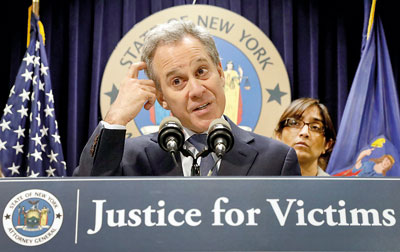Sunday Times 2
Tanya: ‘Brown slave girl’
View(s):Sri Lankan-born Tanya Selvaratnam is one of the four women accusing Eric Schneiderman, New York Attorney General till Tuesday, of sexual harassment. Here is how the prestigious New New Yorker magazine’s Jane Mayer and Ronan Farrow reported Tanya’s troubled relationship with Schneiderman, a supporter of the #MeToo movement.

New York state's top prosecutor, Eric Schneiderman, a public defender of the #MeToo movement and antagonist of Donald Trump, has become the latest public figure to resign over allegations of sexual misconduct. The 63-year-old progressive Democrat resigned late Monday hours after being accused of physically assaulting four women.
Tanya Selvaratnam is the author of “The Big Lie: Motherhood, Feminism, and the Reality of the Biological Clock,” which explores infertility issues; she is also an actor and a film producer, as well as a supporter of feminist and progressive social causes. She is divorced. In 2016, she attended the Democratic National Convention, in Philadelphia, where Schneiderman introduced himself to her. She says that their first encounter felt “like kismet.”
They had both gone to Harvard: she as an undergraduate and a graduate student, he as a law student. She was impressed when he expressed an interest in meditation and Buddhism. They had both studied Chinese, and, when he asked, in Mandarin, if she spoke the language, she answered, “Wo shuo keshi bu tai liuli”—“Yes, but not fluently.”
They began dating, and appeared to be a happy couple. Selvaratnam all but lived in his apartment, attending political functions and dinners with his friends and donors, and brainstorming with him on speeches and projects. But, as she puts it, “it was a fairy tale that became a nightmare.”
Although Schneiderman often doted on her, he demanded that she spend more and more time with him, and he began physically abusing her in bed. “The slaps started after we’d gotten to know each other,” she recalls. “It was at first as if he were testing me. Then it got stronger and harder.” Selvaratnam says, “It wasn’t consensual. This wasn’t sexual playacting. This was abusive, demeaning, threatening behavior.”
When Schneiderman was violent, he often made sexual demands. “He was obsessed with having a threesome, and said it was my job to find a woman,” she says. “He said he’d have nothing to look forward to if I didn’t, and would hit me until I agreed.” (She had no intention of having a threesome.)

Selvaratnam says she understands how incomprehensible it may seem that she stayed in such an abusive relationship for more than a year.
She recalls, “Sometimes, he’d tell me to call him Master, and he’d slap me until I did.” Selvaratnam, who was born in Sri Lanka, has dark skin, and she recalls that “he started calling me his ‘brown slave’ and demanding that I repeat that I was ‘his property.’ ”
The abuse escalated.
Schneiderman not only slapped her across the face, often four or five times, back and forth, with his open hand; he also spat at her and choked her. “He was cutting off my ability to breathe,” she says. Eventually, she says, “we could rarely have sex without him beating me.
In her view, Schneiderman “is a misogynist and a sexual sadist.” She says that she often asked him to stop hurting her, and tried to push him away. At other times, she gave in, rationalizing that she could tolerate the violence if it happened only once a week or so during sex.
But “the emotional and verbal abuse started increasing,” she says, and “the belittling and demeaning of me carried over into our nonsexual encounters.” He told her to get plastic surgery to remove scars on her torso that had resulted from an operation to remove cancerous tumors.
He criticized her hair and said that she should get breast implants and buy different clothes. He mocked some of her friends as “ditzes,” and, when these women attended a birthday celebration for her, he demanded that she leave just as the cake was arriving. “I began to feel like I was in Hell,” she says.
Like the other victim, Manning Barish, Selvaratnam says that Schneiderman routinely drank heavily—a bottle and a half of wine, or more. He also took sedatives, she says, and pushed her to drink with him, saying, “Drink your bourbon, Turnip”—his nickname for her. In the middle of the night, he staggered through the apartment, as if in a trance. “I’ve never seen anyone that messed up,” she recalls. “It was like sleeping next to a monster.”
The next morning, she says, he’d seem fine, but often berated her for not having kept him away from the alcohol. His emotional state seemed to worsen after the 2016 Presidential election. He had counted on forging an ambitious partnership with a White House led by Hillary Clinton. Instead, the Presidency had gone to Donald Trump. Earlier, Schneiderman’s office had sued Trump University for civil fraud, and Trump had countersued Schneiderman personally.
Selvaratnam understands how incomprehensible it may seem that she stayed in such an abusive relationship for more than a year.
But, she says, “now I see how independent women get stuck in one.” The physical abuse, she notes, “happens quickly”: “He’s drunk, and you’re naked and at your most vulnerable. It’s so disorienting. You lose a little of who you are.” She kept telling herself that she could help him change, and tried to get him to see a therapist. At times, she blamed herself for his behavior. “I was scared what he might do if I left him,” she says. “He had said he would have to kill me if we broke up, on multiple occasions. He also told me he could have me followed and could tap my phone.”
It’s unclear if Schneiderman was serious when he made such remarks, but Selvaratnam says that she felt intimidated. Jacquelyn Campbell, a professor at the Johns Hopkins University School of Nursing, is the author of a danger-assessment checklist that helps authorities gauge the likelihood of homicide in domestic-violence situations. She says, “It’s often true that women don’t know whether to take threats to kill seriously. But we should always take threats seriously. It’s categorized as a violent act, and you can report someone to the police for it.”

Manning Barish (pictured) told Tanya she found it “shameless” that Schneiderman was casting himself as a leading supporter of the #MeToo movement
Selvaratnam began to spend more time apart from Schneiderman, and last fall she ended the relationship. She’d been suffering from ringing in her ears, and sometimes had vertigo. After the breakup, she, like Manning Barish, sought medical help from an ear, nose, and throat specialist.
The doctor could find no specific cause for her ailments. The writer Danzy Senna, a close friend of Selvaratnam’s, recalls, “She was thin, fragile, and shaky.” Selvaratnam confided to Senna about the abuse, and Senna was so shocked that she wrote down the details and e-mailed the account to her husband, so that there would be a dated copy of it should any harm come to her friend. Senna’s document, which she shared with The New Yorker, is dated September 16, 2017, and says, in part, “She told me that her boyfriend of a year, Eric Schneiderman, the Attorney General of New York, has been choking, beating, and threatening her for the entirety of their relationship, and that several times he threatened to have her killed if she ever tried to leave him.
She said he knows that she has a lot of really damning information about him, his alcoholism, sexual deviance, and drug use, and she worries about her safety.”
Senna advised Selvaratnam to retrieve her belongings from his apartment. On November 3, 2017, she did so, with another friend—Jennifer Gonnerman, a staff writer at this magazine. As they carried her things outside, they talked about the fact that Selvaratnam couldn’t possibly be the only woman who had seen this side of Schneiderman. Gonnerman asked her who else he had dated.
Selvaratnam knew of one former girlfriend—not Manning Barish—and described where she had worked.
The next day, Gonnerman happened to run into a male friend who had once worked with the former girlfriend. Gonnerman asked him if he’d ever known anyone who had dated Schneiderman. He said yes: a close friend of his had. Without divulging anything, Gonnerman asked, “So how did that work out?” He answered, “He used to spit on her and slap her during sex.”
Gonnerman told Selvaratnam about the other victim. “She was very traumatized,” Gonnerman recalls. “On the one hand, she was relieved to learn it had happened before, but on the other it was, like, ‘Why hasn’t anyone stopped him?’ ”
Selvaratnam says, “I wished someone had warned me. And I wondered, Who’s next?” She notes, “I was not planning to come forward, until I found out there was another woman. The silence of women before me meant that I’d suffered, too. I felt, I will not be able to live with myself if I hear of him doing this to another woman years or months from now.”
Selvaratnam reached out to the former girlfriend, and they agreed to meet. In February, Selvaratnam recalls, they sat outside on a bench for ninety minutes, and their stories came flooding forth. Selvaratnam says that she was astounded to discover how similar their experiences had been.
Selvaratnam kept notes about her exchanges with the former girlfriend, and she described them to The New Yorker. According to these notes, the former girlfriend told Selvaratnam that she had been in love with Schneiderman, but that in bed he had routinely slapped her hard across the ear and the face, as tears rolled down her cheeks. He also choked her and spat at her. Not all the abuse had taken place in a sexual context.
She said that Schneiderman had once slapped her during an argument they’d had while getting dressed to go out. The blow left a handprint on her back; the next day, the spot still hurt. When the former girlfriend objected to this mistreatment, he told her that she simply wasn’t “liberated” enough.
Just as Schneiderman had done with the other women, he had pushed her to drink with him and to set up a threesome, and he had belittled her work and appearance, saying in her case that she had fat legs and needed Botox.
After the former girlfriend ended the relationship, she told several friends about the abuse. A number of them advised her to keep the story to herself, arguing that Schneiderman was too valuable a politician for the Democrats to lose. She described this response as heartbreaking.
And when Schneiderman heard that she had turned against him, she said, he warned her that politics was a tough and personal business, and that she’d better be careful. She told Selvaratnam that she had taken this as a threat.
The former girlfriend told Selvaratnam she found it “shameless” that Schneiderman was casting himself as a leading supporter of the #MeToo movement. She promised to support Selvaratnam if she spoke out, but she wasn’t sure that she could risk joining her. The former girlfriend told Selvaratnam she’d once been so afraid of Schneiderman that she’d written down an extensive account of the abuse, locked the document in a safe-deposit box, and given keys to two friends.
In February, the news broke that Rob Porter, a top aide in the Trump White House, was resigning, amid allegations that he’d abused his two ex-wives. One of the women, Colbie Holderness, released a photograph of herself taken after he’d allegedly given her a black eye.
The image resonated deeply among the women who had dated Schneiderman. Manning Barish recalls, “After Rob Porter, I was struggling about whether to come forward. I felt guilt and shame that I was encouraging other women to speak out but wasn’t doing the same. I was a hypocrite. I was in tears.”
Her friends told her that she risked becoming known mainly for being Schneiderman’s victim, and she initially agreed to let the matter go. But, after thinking it over, she told them, “If he’s done this to more than one woman, I’m going to say something.”
After Porter’s resignation, Selvaratnam felt more determined than ever to speak out about Schneiderman and the broader issue of intimate-partner violence. As this story was being reported, Manning Barish became aware that there were other victims, and decided that she had three choices: “I can lie. I can be silent, which is being complicit, and a betrayal of the other women. Or I can tell the truth.” She concluded, “I’m choosing No. 3.”
Manning Barish is aware of the risks faced by women who take on powerful politicians, and isn’t relishing the prospect of taking on the attorney general. “It’s hard,” she says. “It affects your life, and not in a positive way.”
Selvaratnam says that she considered filing an ethics complaint against Schneiderman, or bringing a civil suit, but the various legal options she considered were always connected to Schneiderman in some way.
Meanwhile, at least eight members of Congress had resigned, or announced plans to retire, after being accused of sexual misconduct. In Missouri, the legislature called a special session to take up the impeachment of Governor Eric Greitens, who had been accused of slapping, restraining, and belittling a woman during an affair. Greitens has denied the allegations, but he is facing a felony charge stemming from the woman’s assertion that he took compromising photographs of her, in an effort to stop her from speaking out.
Selvaratnam, by contrast, feels caught up in circumstances that have given her only one real choice: to go public. “It’s torturous for me to do this,” she says. “I like my life.” Of this article, she says, “I wish my name did not have to be in it,” and notes, of Schneiderman, “I know it’s going to be my word against his, because I don’t have photos of bruises, and I don’t have a police report.” Schneiderman’s accusers, she feels, are in an unusually difficult situation. As she puts it, “What do you do if your abuser is the top law-enforcement official in the state?

